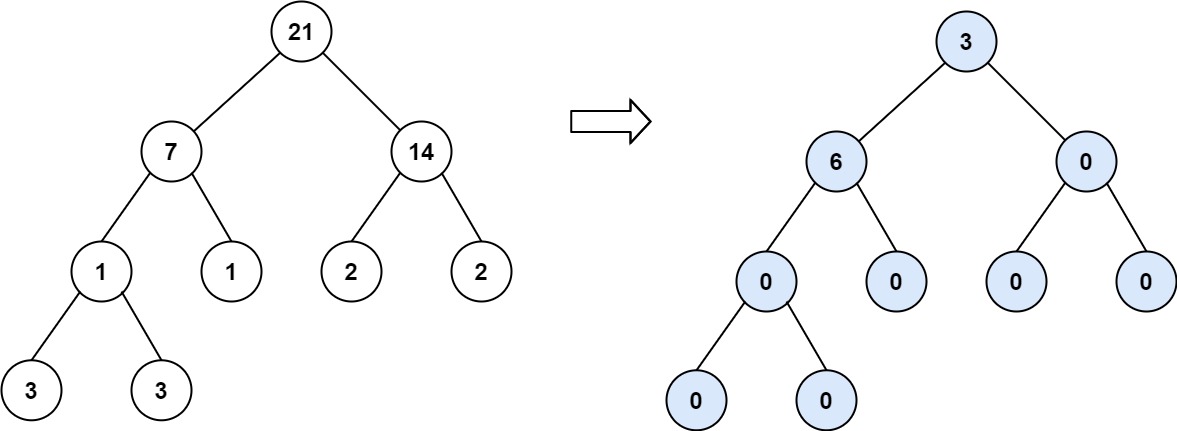Binary Tree Tilt
EasyUpdated: Aug 2, 2025
Practice on:
Problem
Given the root of a binary tree, return the sum of every tree node 's tilt.
The tilt of a tree node is the absolute difference between the sum of all left subtree node values and all right subtree node values. If a node does not have a left child, then the sum of the left subtree node values is treated as 0. The rule is similar if the node does not have a right child.
Examples
Example 1

Input: root = [1,2,3]
Output: 1
Explanation:
Tilt of node 2 : |0-0| = 0 (no children)
Tilt of node 3 : |0-0| = 0 (no children)
Tilt of node 1 : |2-3| = 1 (left subtree is just left child, so sum is 2; right subtree is just right child, so sum is 3)
Sum of every tilt : 0 + 0 + 1 = 1
Example 2

Input: root = [4,2,9,3,5,null,7]
Output: 15
Explanation:
Tilt of node 3 : |0-0| = 0 (no children)
Tilt of node 5 : |0-0| = 0 (no children)
Tilt of node 7 : |0-0| = 0 (no children)
Tilt of node 2 : |3-5| = 2 (left subtree is just left child, so sum is 3; right subtree is just right child, so sum is 5)
Tilt of node 9 : |0-7| = 7 (no left child, so sum is 0; right subtree is just right child, so sum is 7)
Tilt of node 4 : |(3+5+2)-(9+7)| = |10-16| = 6 (left subtree values are 3, 5, and 2, which sums to 10; right subtree values are 9 and 7, which sums to 16)
Sum of every tilt : 0 + 0 + 0 + 2 + 7 + 6 = 15
Example 3

Input: root = [21,7,14,1,1,2,2,3,3]
Output: 9
Constraints
- The number of nodes in the tree is in the range
[0, 10^4]. -1000 <= Node.val <= 1000
Solution
Method 1 – Postorder DFS (Subtree Sums)
Intuition
To compute the tilt for each node, we need the sum of values in its left and right subtrees. A postorder DFS allows us to compute subtree sums and node tilts efficiently in one pass.
Approach
- Define a recursive DFS function that returns the sum of the subtree rooted at the current node.
- For each node, recursively compute the left and right subtree sums.
- The tilt at the node is the absolute difference between left and right subtree sums.
- Accumulate the tilt for all nodes in a variable.
- Return the total tilt after traversing the tree.
Code
C++
struct TreeNode {
int val;
TreeNode *left;
TreeNode *right;
TreeNode(int x) : val(x), left(nullptr), right(nullptr) {}
};
class Solution {
public:
int ans = 0;
int dfs(TreeNode* node) {
if (!node) return 0;
int l = dfs(node->left);
int r = dfs(node->right);
ans += abs(l - r);
return l + r + node->val;
}
int findTilt(TreeNode* root) {
dfs(root);
return ans;
}
};
Go
type TreeNode struct {
Val int
Left, Right *TreeNode
}
func findTilt(root *TreeNode) int {
ans := 0
var dfs func(*TreeNode) int
dfs = func(node *TreeNode) int {
if node == nil { return 0 }
l := dfs(node.Left)
r := dfs(node.Right)
ans += abs(l - r)
return l + r + node.Val
}
dfs(root)
return ans
}
func abs(x int) int { if x < 0 { return -x }; return x }
Java
class TreeNode {
int val;
TreeNode left, right;
TreeNode(int x) { val = x; }
}
class Solution {
int ans = 0;
int dfs(TreeNode node) {
if (node == null) return 0;
int l = dfs(node.left);
int r = dfs(node.right);
ans += Math.abs(l - r);
return l + r + node.val;
}
public int findTilt(TreeNode root) {
dfs(root);
return ans;
}
}
Kotlin
data class TreeNode(var `val`: Int, var left: TreeNode? = null, var right: TreeNode? = null)
class Solution {
var ans = 0
fun dfs(node: TreeNode?): Int {
if (node == null) return 0
val l = dfs(node.left)
val r = dfs(node.right)
ans += kotlin.math.abs(l - r)
return l + r + node.`val`
}
fun findTilt(root: TreeNode?): Int {
dfs(root)
return ans
}
}
Python
class TreeNode:
def __init__(self, val=0, left=None, right=None):
self.val = val
self.left = left
self.right = right
class Solution:
def findTilt(self, root: TreeNode) -> int:
self.ans = 0
def dfs(node: TreeNode) -> int:
if not node:
return 0
l = dfs(node.left)
r = dfs(node.right)
self.ans += abs(l - r)
return l + r + node.val
dfs(root)
return self.ans
Rust
// Definition for a binary tree node.
pub struct TreeNode {
pub val: i32,
pub left: Option<Box<TreeNode>>,
pub right: Option<Box<TreeNode>>,
}
impl Solution {
pub fn find_tilt(root: Option<Box<TreeNode>>) -> i32 {
fn dfs(node: &Option<Box<TreeNode>>, ans: &mut i32) -> i32 {
if let Some(node) = node {
let l = dfs(&node.left, ans);
let r = dfs(&node.right, ans);
*ans += (l - r).abs();
l + r + node.val
} else {
0
}
}
let mut ans = 0;
dfs(&root, &mut ans);
ans
}
}
Complexity
- ⏰ Time complexity:
O(n)— Each node is visited once. - 🧺 Space complexity:
O(h)— h is the height of the tree (recursion stack).